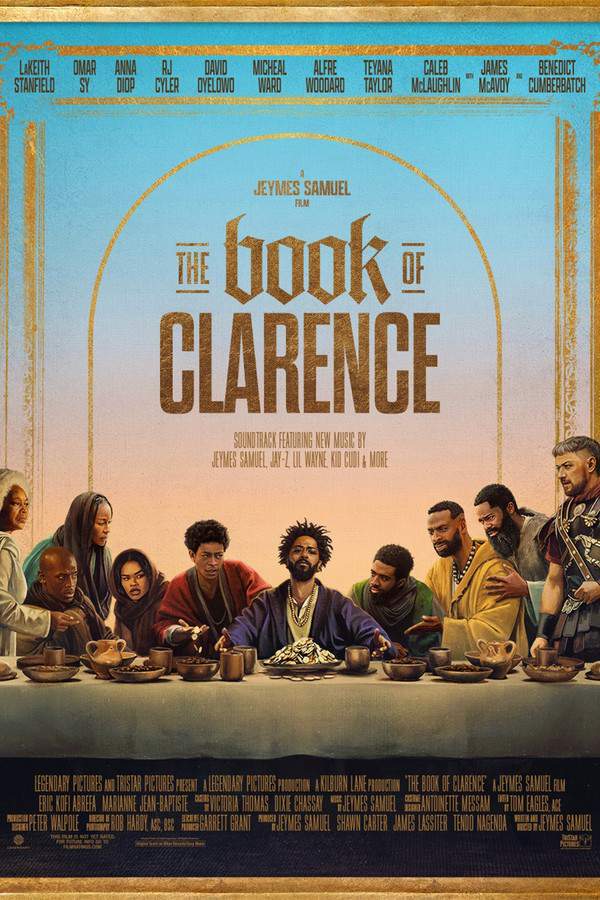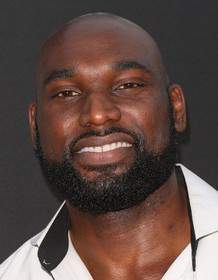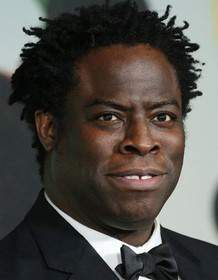The Book of Clarence 2024

Facing hardship and seeking a better life for his family, Clarence embarks on a daring journey. Inspired by the stories of Jesus and his disciples, he sets out on his own path, risking everything to bring hope and healing to his community. This heartwarming story explores the power of faith, courage, and the potential for redemption found in unexpected places.
Does The Book of Clarence have end credit scenes?
No!
The Book of Clarence does not have end credit scenes. You can leave when the credits roll.
Meet the Full Cast and Actors of The Book of Clarence
Explore the complete cast of The Book of Clarence, including both lead and supporting actors. Learn who plays each character, discover their past roles and achievements, and find out what makes this ensemble cast stand out in the world of film and television.

Benedict Cumberbatch
Benjamin

Micheal Ward
Judas Iscariot

Lakeith Stanfield

Omar Sy
Barabbas

Alfre Woodard
Virgin Mary

Marianne Jean-Baptiste
Amina

Chidi Ajufo
Goliath

RJ Cyler
Elijah

David Oyelowo
John the Baptist

James McAvoy
Pontius Pilate

Anna Diop
Varinia

Nicholas Pinnock
Jesus

Andrea Ali

Memu Conteh

Chase Dillon
Cabbage

Fejiro Emasiobi

Francis Ezekiel

Miguel Francisco

Daniel Fraser

Caleb Frederick
External Links and Streaming Options
Discover where to watch The Book of Clarence online, including streaming platforms, rental options, and official sources. Compare reviews, ratings, and in-depth movie information across sites like IMDb, TMDb, Wikipedia or Rotten Tomatoes.
Ratings and Reviews for The Book of Clarence
See how The Book of Clarence is rated across major platforms like IMDb, Metacritic, and TMDb. Compare audience scores and critic reviews to understand where The Book of Clarence stands among top-rated movies in its genre.

The Movie Echo Score
While The Book of Clarence offers moments of inventive style and committed performances, it struggles to unify its varied tones into a cohesive whole. Critics and viewers praised the film’s art design and LaKeith Stanfield’s nuanced portrayal, noting effective production values and bold directorial choices. However, many also cited uneven pacing, a rudimentary script, and erratic tonal shifts that undercut engagement. Ultimately, the film presents intriguing ideas and striking visuals but often feels disjointed in execution.
The Movie Echo Score Breakdown for The Book of Clarence

Art & Craft
In terms of art and craft, the film displays striking production design and bold visual choices but also uneven execution. Reviews highlight well-realized sets, cinematography inspired by biblical epics, and inventive color palettes. However, critics noted experimental editing that feels haphazard in places. The art direction is ambitious yet inconsistently realized.

Character & Emotion
When it comes to character and emotion, performances receive consistent praise for depth and charisma but are sometimes hindered by shallow scripting. Reviewers commend LaKeith Stanfield’s nuanced central turn and supporting cast chemistry, noting engaging moments of sincerity. However, underdeveloped character arcs and reliance on familiar tropes dampen emotional resonance. The character work is lively yet uneven.

Story & Flow
In terms of story and flow, the narrative concept is original and thought-provoking but suffers from uneven pacing and a rudimentary script. Critics point to creative gospel-inspired plotting and satirical potential, yet many note cluttered structure and tonal inconsistency between comedy and drama. Engagement fluctuates as scenes oscillate between compelling and forgettable. The story holds promise but lacks cohesion.

Sensory Experience
When it comes to sensory experience, the film features an engaging soundtrack and atmospheric sound design alongside visually cohesive style. Reviewers praise the score’s integration and immersive environments, noting thematic color palettes and period-evoking backgrounds. Yet some critics find the balance between spectacle and narrative distracting, and sound cues occasionally underplay dramatic moments. Overall, the sensory elements are rich but uneven.

Rewatch Factor
In terms of rewatch factor, the film offers striking visuals and bold thematic ideas that invite revisitation, yet erratic rhythm and uneven scripting limit its lasting appeal. Some viewers highlight compelling humor and inventive sequences, while others find the tonal shifts and structural inconsistencies deter repeated viewing. The film has intriguing moments deserving further exploration but struggles to sustain cohesive enjoyment.

57
Metascore
6.3
User Score


66%
TOMATOMETER

80%
User Score

59
%
User Score

3.1
From 104 fan ratings

3.67/5
From 3 fan ratings
Take the Ultimate The Book of Clarence Movie Quiz
Challenge your knowledge of The Book of Clarence with this fun and interactive movie quiz. Test yourself on key plot points, iconic characters, hidden details, and memorable moments to see how well you really know the film.
The Book of Clarence Quiz: Test your knowledge about 'The Book of Clarence' and its intricate narrative set in A.D. 33 Jerusalem.
What desperate situation is Clarence faced with?
He struggles to make ends meet
He seeks wealth through gambling
He is in a romantic crisis
He is leading a rebellion
Show hint
Full Plot Summary and Ending Explained for The Book of Clarence
Read the complete plot summary of The Book of Clarence, including all major events, twists, and the full ending explained in detail. Explore key characters, themes, hidden meanings, and everything you need to understand the story from beginning to end.
The story unfolds through a series of interwoven vignettes, punctuated by titles reminiscent of the Ten Commandments: “The 13th Apostle”, “The New Messiah”, and “The Crucifixion.” Set against the backdrop of A.D. 33 Jerusalem, a desperate character named Clarence finds himself struggling to survive, his fate closely intertwined with that of his friend, Elijah.
Their misfortunes, including a disastrous chariot race involving Mary Magdalene, serve as ominous signs of trouble ahead. Together, they face numerous challenges: darts thrown by gypsies and a narrow escape from trampling the unfortunate Benjamin, a filthy beggar. Clarence’s troubles multiply as he falls deeper into debt with the merciless loan shark Jedediah the Terrible, whose sister Varinia captures his secret affection. Compounding their struggles, Roman soldiers unjustly accuse Clarence and Elijah of theft, subjecting them to racial profiling.
As Clarence navigates this perilous world, his moral compass begins to waver. A habitual smoker of marijuana and a thief of honey wine, he succumbs to opium one fateful day, surrounded by the lifeless bodies of fellow addicts. In a moment of clarity, he dreams of becoming a false messiah, hoping to ride Jesus Christ’s rising fame to erase his debts and garner fame.
John the Baptist, however, is unimpressed by Clarence’s duplicity when he visits the baptism site. Undeterred, Clarence pitches his scheme to the Twelve Apostles, only to meet with mockery and disdain. His twin brother Thomas, a member of the Twelve, dismisses him, embittered by their troubled history.
As tensions escalate, Judas Iscariot proposes that Clarence earn his stripes by liberating a group of gladiators, presenting him with a chance to prove himself. Seizing this opportunity, Clarence approaches the gladiators’ owner to negotiate their release. However, the owner has ulterior motives, offering to let the gladiators go if they defeat Clarence in combat or face the formidable Barabbas the Immortal.
Using cunning and strategy, Clarence triumphs, securing the gladiators’ freedom along with that of Barabbas, who becomes an unexpected ally. As their adventures unfold, Clarence begins performing “miracles,” such as resurrecting Elijah, leading to wealth accumulation.
Despite his growing success as a self-styled messiah, Clarence’s true motivations remain clouded. He and Barabbas consult Jesus’ parents, Mary and Joseph, seeking advice on replicating their son’s miracles. To their dismay, the couple reminds them that Jesus is a true figure of faith, not a fraud.
As the drama reaches its peak, Clarence must face the repercussions of his actions, including the debts owed to Jedediah and the resentment of those deceived by his false claims. When Mary Magdalene is condemned to death by stoning due to the Roman occupation’s influence, Elijah bravely steps in to protect her. Jesus, however, intervenes, miraculously pausing the stones mid-air and admonishing the accusers for their own sins. With a display of divine power, he heals Mary, solidifying Elijah’s faith.
In the shadows, betrayal brews as Varinia breaks Clarence’s trust at an extravagant event while Jedediah lurks nearby to claim payment from the unsuspecting entertainers. The Romans, eager to exploit the situation, align with Jedediah, yet Barabbas stands resolute, defying Clarence’s pleas to escape.
Wounded by Roman spears, Barabbas astonishingly survives, avenging himself upon the centurion sent to kill him. Jedediah is impressed by his resilience, leading to a brief reconciliation with Clarence, but this fragile peace shatters as the Romans apprehend Clarence for being a possible threat to their rule.
During an interrogation led by Pontius Pilate, Clarence confesses his deception, declaring himself a charlatan rather than the supposed messiah. Still, Pilate offers him hope, challenging him to walk across a nearby pool as a test of his supposed divinity. To his astonishment, Clarence succeeds, yet Pilate remains unmoved, sentencing him to crucifixion.
In the prison cell, Varinia visits Clarence, sharing a tender kiss that evokes memories of their betrayal. Thomas also visits, seeking to mend fences over past grievances. Meanwhile, Pilate dismisses Jesus’ teachings of equality and humanity as mere illusions, prompting Clarence to mock the Romans’ tendency to depict their leaders in revealing ways.
While Jesus distributes coins to the needy, he empowers Benjamin to enhance his wealth, which leads to unexpected attention from the Romans, who mistake him for another messianic figure. As Clarence nears the cross, he is flanked by Amina, Elijah, and Barabbas, all witnessing his final moments. In an unexpected twist, Cabbage, a spirited gypsy, offers assistance in carrying Clarence’s heavy burdens.
During this somber procession, Benjamin, crucified alongside Clarence, laments an artist capturing his likeness on canvas, a depiction eerily similar to traditional images of Jesus. In a poignant moment, Jesus gathers his mournful disciples, foretelling his betrayal and death, but also his resurrection.
Later, he visits Clarence’s tomb, forgiving his earlier doubt and restoring him to life, healing the wounds inflicted by Roman tyranny. As Clarence rises from his grave, his eyes filled with newfound enlightenment, he transforms from a mere believer into one who truly “knows,” radiating an illuminating smile that dispels the surrounding darkness.
Uncover the Details: Timeline, Characters, Themes, and Beyond!

Coming soon on iOS and Android
The Plot Explained Mobile App
From blockbusters to hidden gems — dive into movie stories anytime, anywhere. Save your favorites, discover plots faster, and never miss a twist again.
Sign up to be the first to know when we launch. Your email stays private — always.
Watch Trailers, Clips & Behind-the-Scenes for The Book of Clarence
Watch official trailers, exclusive clips, cast interviews, and behind-the-scenes footage from The Book of Clarence. Dive deeper into the making of the film, its standout moments, and key production insights.
The Book of Clarence Other Names and Titles
Explore the various alternative titles, translations, and other names used for The Book of Clarence across different regions and languages. Understand how the film is marketed and recognized worldwide.
Quick Links: Summary, Cast, Ratings, More

What's After the Movie?
Not sure whether to stay after the credits? Find out!
Explore Our Movie Platform
New Movie Releases (2025)
Famous Movie Actors
Top Film Production Studios
Movie Plot Summaries & Endings
Major Movie Awards & Winners
Best Concert Films & Music Documentaries
Movie Collections and Curated Lists
© 2025 What's After the Movie. All rights reserved.
















